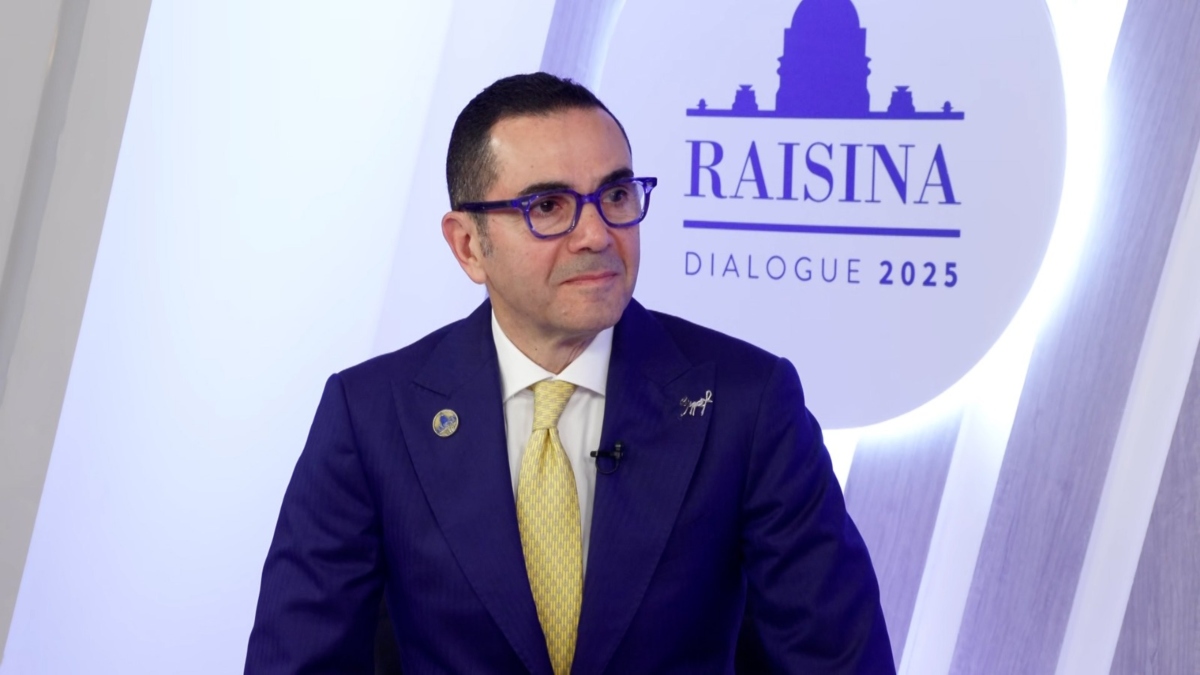Egypt’s Minister for Investment and Trade of Egypt, El Khatib said that the trade between India and Egypt is small compared to its potential. While speaking to Mihir Swarup Sharma, Director of the Centre for Economy and Growth Programme, ORF at Firstpost’s IdeaPod, El Khatib said that Egypt and India are “two of the world’s greatest civilisations”.
The conversation took place on Tuesday, on the sidelines of the 2025 Raisina Dialogue. During the interview, El Khatib emphasised that India and Egypt should talk about tripling or quadrupling trade volume, not just increasing it by 10-20 per cent, insisting that “trade and investment are the lifeblood of economies.”
“First, let me say that India and Egypt are two of the world’s greatest civilizations. I have visited India as a tourist in the past, and I see a lot of interest from Indians in visiting Egypt. When I come here, I feel at home,” Khatib told Firstpost.
“However, when we talk about trade between our two countries, it is small compared to its potential. This is something I discussed with India’s Minister of Trade. We need to talk about tripling or quadrupling trade volume, not just increasing it by 10-20%. Trade and investment are the lifeblood of economies,” he added.
El Khatib emphasised that food and energy security are two sectors India and Egypt can collaborate strongly. “Regarding food security and energy security, these are major issues. Egypt aspires to become a green energy hub. We are discussing this with multiple players, including Indian and European companies. Egypt has plenty of land, sunshine, and strong winds along the Red Sea. We plan to add 65 GW of energy between now and 2040, 85-90% of which will be green energy. This does not include our green hydrogen potential, which could match or exceed that number once the industry’s pricing challenges are resolved,” he said.
Impact Shorts
More Shorts“Energy security and economic resilience are what matter most going forward. We need agility, as global events are moving faster than government policies. Artificial intelligence and other disruptions will affect every economy and every individual,” the Egyptian minister furthered.
How Egypt is navigating the current world order
When asked how Egypt is navigating the world order, where US President Donald Trump is threatening tariffs on numerous countries and other nations taking a protectionist approach. El Khatib said, “Globalization, as we’ve lived it for the past three to four decades, is fading away.”
“We’re opening a new chapter—one highlighted by nationalism, borders, protectionism, and tariffs. This is not new. We saw it during President Trump’s first term, and we’re seeing it in Europe with nationalist movements gaining momentum over the past ten years. Looking at projections for elections in major European cities, this trend seems set to continue.” he said.
El Khatib made it clear that Egypt focuses on being as competitive as possible given the region it is located. “For an economy like Egypt, in a neighbourhood that is not the easiest, our focus as a government is very simple. We want to be as competitive as possible. We want to create a business environment that is conducive for the private sector to prosper and invest. We want to boost foreign direct investment (FDI) and maximize the return on what we’ve invested in infrastructure over the past ten years,” he said.
He recalled that after two revolutions (2011 and 2013), Cairo embarked on major programs to stimulate the economy “We built a massive network of roads, 24 new cities, expanded our ports on the Mediterranean and the Red Sea, developed major power projects (including renewable energy), and expanded public transport,” he explained.
Dealing with a turbulent neighbourhood
While Egypt’s economy takes stride, the situation in the continent it is part of remains turbulent. When asked about his take on the African Continental Free Trade Agreement, Khatib put forward an optimistic outlook. “Africa is a major focus for us. We have trade agreements that provide access to 70 markets, including the EU, the Arab Free Trade Agreement, and the Agadir Agreement. We also have two major agreements in Africa—the COMESA (22 countries in Eastern and Southern Africa) and the African Continental Free Trade Agreement,” he said.
However, Khatib said that Africa has its own share of challenges in transportation, logistics, credit guarantees, and export guarantees. “the cost of shipping is a major deterrent. We are working on solutions, including ship lines, airline connectivity, and logistical hubs. For example, Chad has massive livestock resources but only one slaughterhouse and poor road connectivity. We are discussing building a road from Egypt to Chad to facilitate trade,” he averred.
“Trade with Africa must be balanced. We need to understand what we can import from Africa and focus on industrialization within the continent, rather than just exporting raw materials,” El Khatib concluded.
)